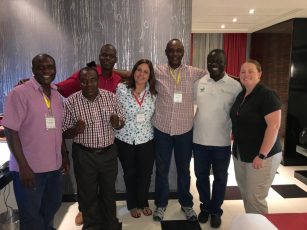
On 3 November 2016, 10 scientists from the Cassava Diagnostic Project (CDP) published their work in the prestigious journal Nature: Scientific Reports – making widely available the results of research by a team of 5 women and 5 men from Australia, Tanzania, Uganda and the USA. Their paper focuses on why Cassava Brown Streak Virus (CBSV) has the potential to be more damaging than Ugandan Cassava Brown Streak Virus (UCBSV), and is titled Cassava brown streak virus has a rapidly evolving genome: implications for virus speciation, variability, diagnosis and host resistance.
The scientists used whole genome sequences from Next-Generation Sequencing data to create an innovative framework that treats these two groups of viruses as separate species. This analysis led to the discovery that not only does CBSV evolve faster than UCBSV, but that the mutations which result in physical changes are more common across the entire CBSV genome. This suggests that CBSV may be ‘outsmarting’ the immune system of the cassava, making it more destructive and harder to control than UCBSV.
These are crucial findings that will go a long way towards helping the smallholder farmers dealing with the devastation caused by these viruses.
For more information on the AgShare.Today project and its work, please contact l.ulanowski@agshare.today


